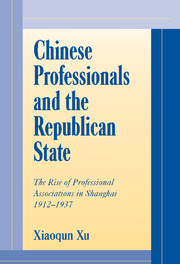 Chinese Professionals and the Republican State
Chinese Professionals and the Republican State Book contents
- Frontmatter
- Contents
- List of Tables
- Acknowledgments
- Abbreviations of Frequently Cited Sources
- Introduction
- Part I Professions and Professionals
- Part II Social Institutions, State Actions, and Professionalization
- Part III Professionalism, Nationalism, and Politics
- 6 From “Literary Men” to Professionals: Shanghai Journalists
- 7 National Essence versus Science: The Medical Profession in Conflict
- 8 Professionalism and Nationalism: The Shanghai Bar Association (I)
- 9 Professionalism and Politics: The Shanghai Bar Association (II)
- Conclusion to Part III
- Conclusion
- Glossary
- Bibliography
- Index
8 - Professionalism and Nationalism: The Shanghai Bar Association (I)
Published online by Cambridge University Press: 07 September 2009
- Frontmatter
- Contents
- List of Tables
- Acknowledgments
- Abbreviations of Frequently Cited Sources
- Introduction
- Part I Professions and Professionals
- Part II Social Institutions, State Actions, and Professionalization
- Part III Professionalism, Nationalism, and Politics
- 6 From “Literary Men” to Professionals: Shanghai Journalists
- 7 National Essence versus Science: The Medical Profession in Conflict
- 8 Professionalism and Nationalism: The Shanghai Bar Association (I)
- 9 Professionalism and Politics: The Shanghai Bar Association (II)
- Conclusion to Part III
- Conclusion
- Glossary
- Bibliography
- Index
Summary
IN EARLY January 1912 a group of fourteen Chinese lawyers, upon learning that bar associations were being formed in Jiangsu and Zhejiang Provinces, decided to establish a lawyers' association in Shanghai. In a petition to Chen Qimei, the military governor of Shanghai at the time, they stated their purpose as follows:
When it comes to legal disputes, the people's rights all rely upon the defense. Since to date the knowledge of law has not been widely shared, it is inevitable that honest people suffer injustice, cunning people get away with sharp tongue, magistrates try cases without getting to the truth, and the people's rights are not protected. Even if lawyers are hired, they are often foreigners who know little about Chinese customs and mores. Besides, while it is easy to find foreign lawyers in commercial cities and metropolises, they are not readily available in the interior. … Shanghai is a place of commerce where people clustered and lawsuits abound. Having been trained in law or served in the judicial system, we have [legal] knowledge and experience. Indignant that the foreign concessions have extraterritoriality, while our nation's sovereignty is incomplete, and that foreigners monopolized the lawsuits between the Chinese and foreigners, we plan to organize in the Shanghai area a lawyer's association of the Chinese Republic to protect the people's rights and to spread the spirit of the rule of law throughout the country.
- Type
- Chapter
- Information
- Chinese Professionals and the Republican StateThe Rise of Professional Associations in Shanghai, 1912–1937, pp. 215 - 241Publisher: Cambridge University PressPrint publication year: 2000
- 1
- Cited by


